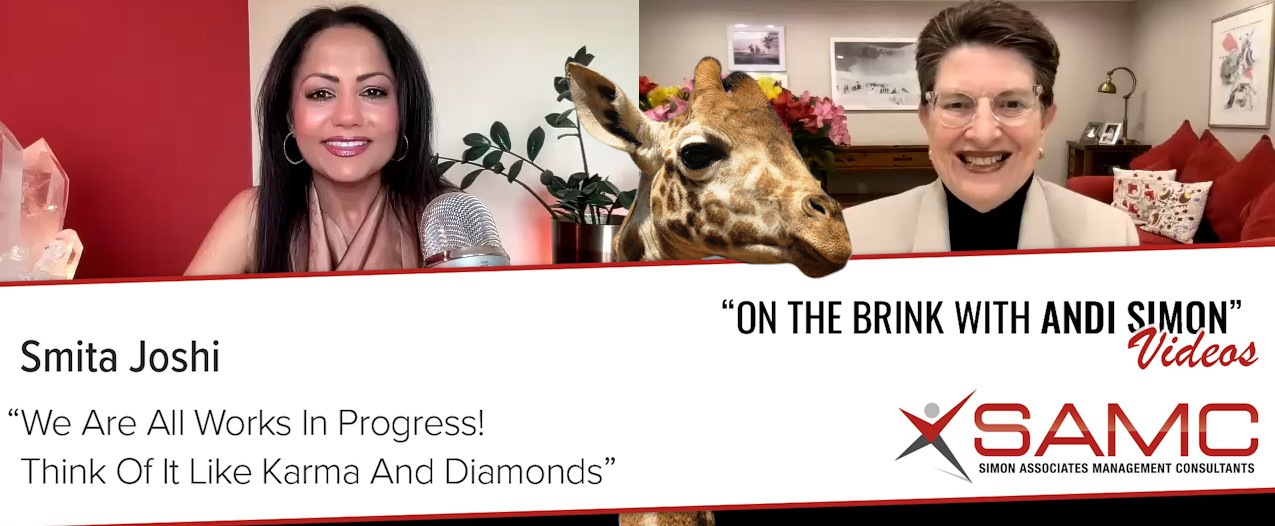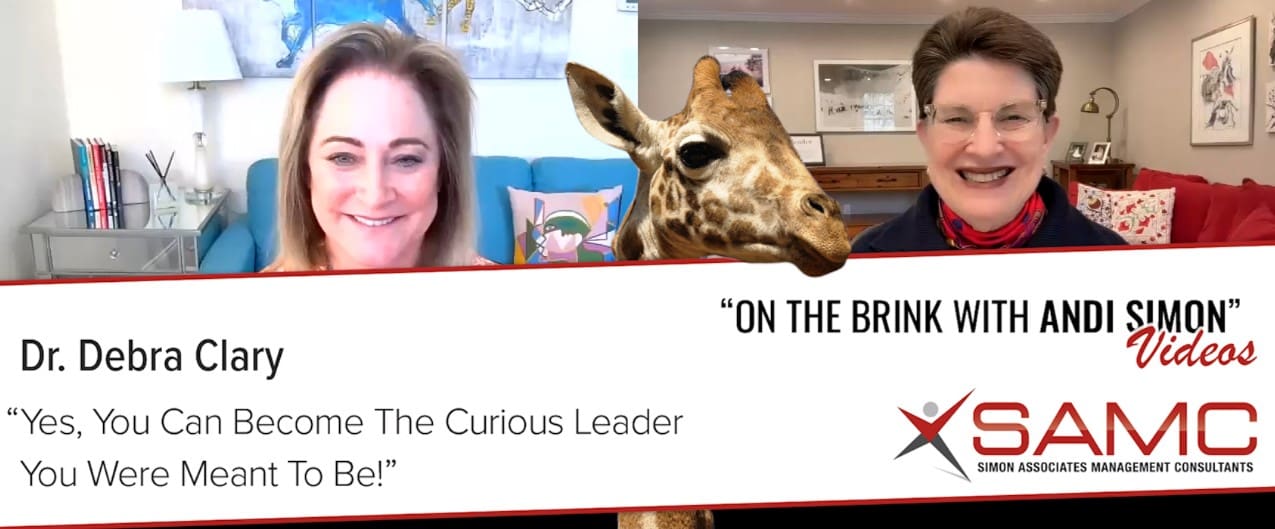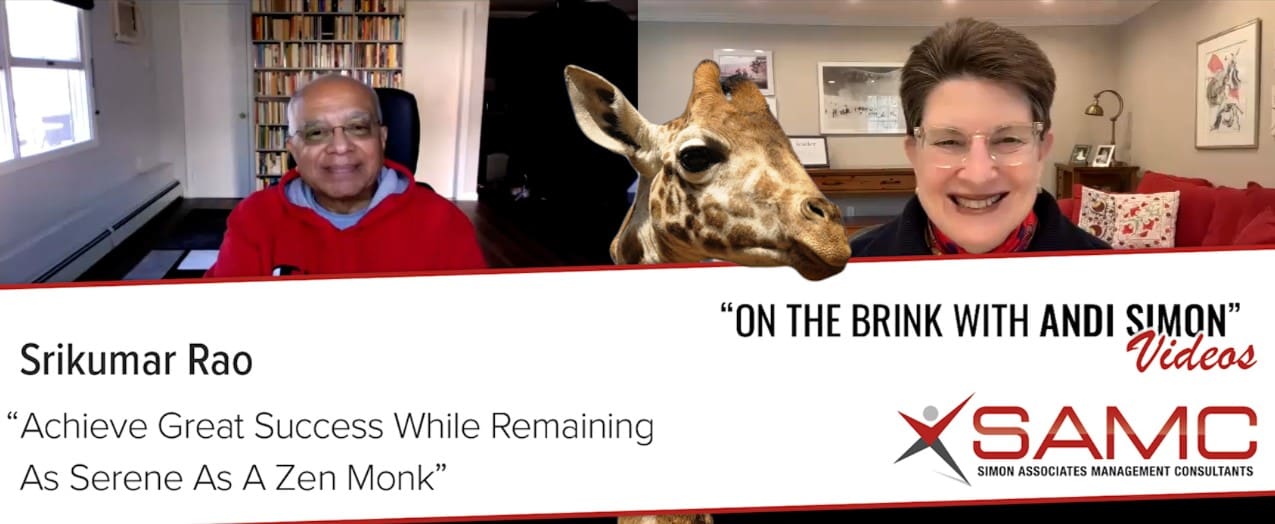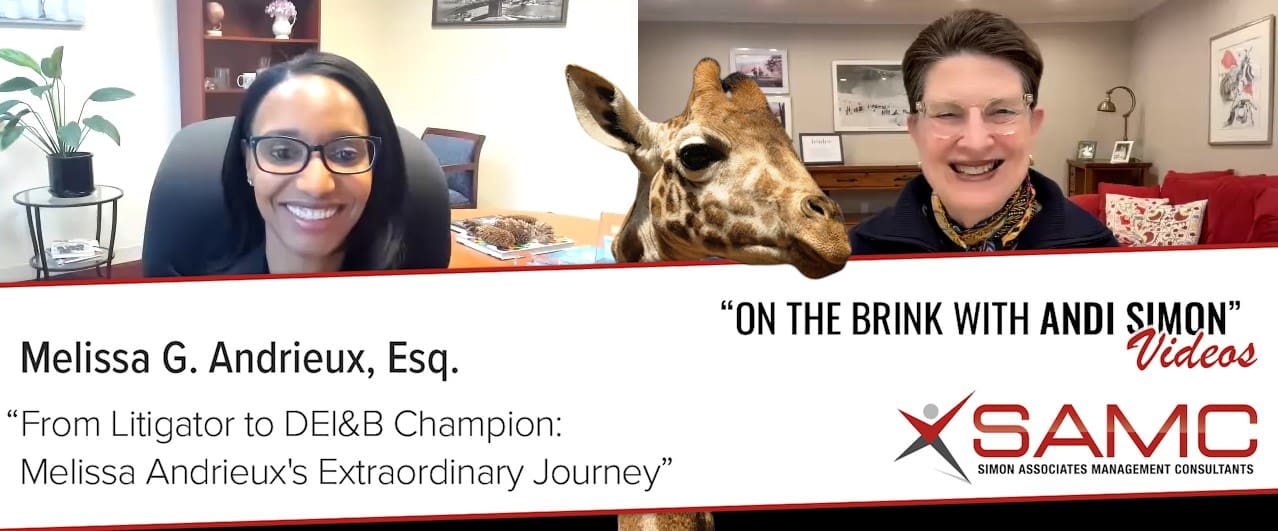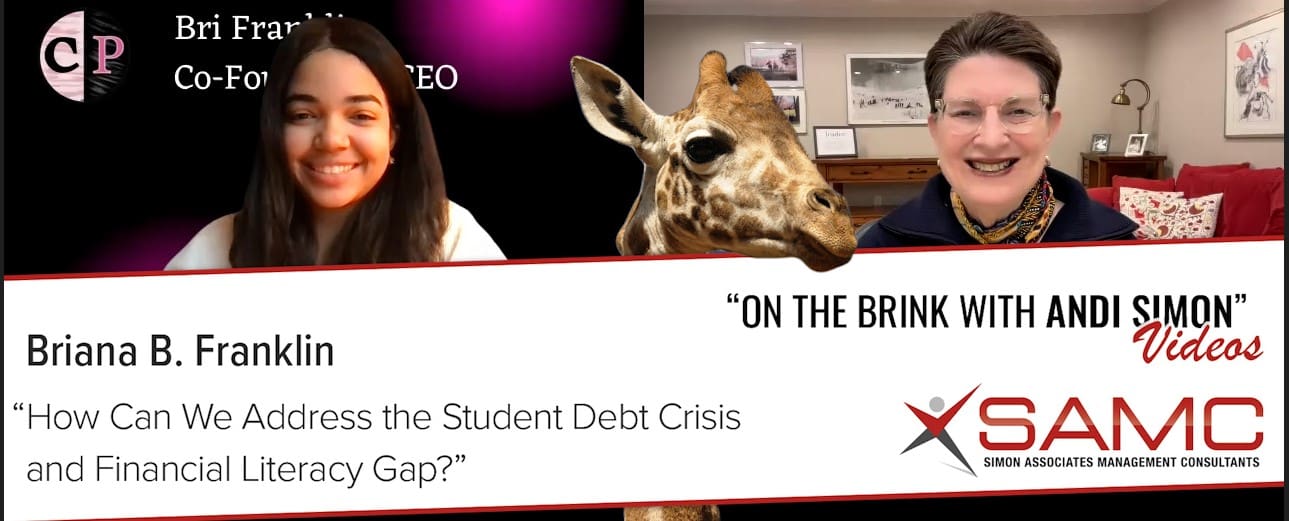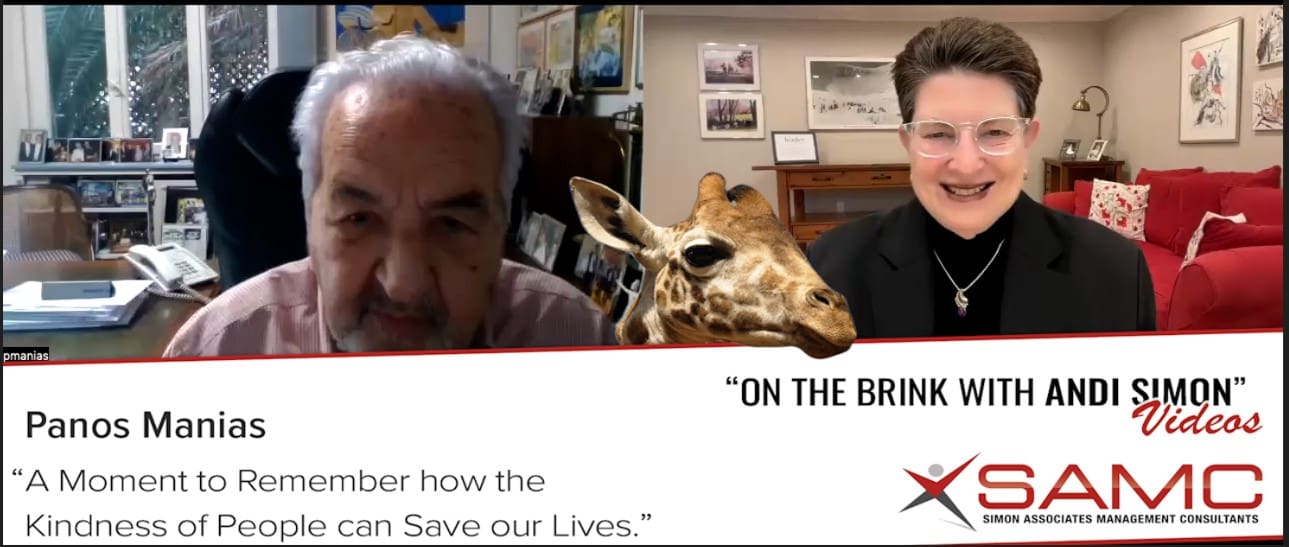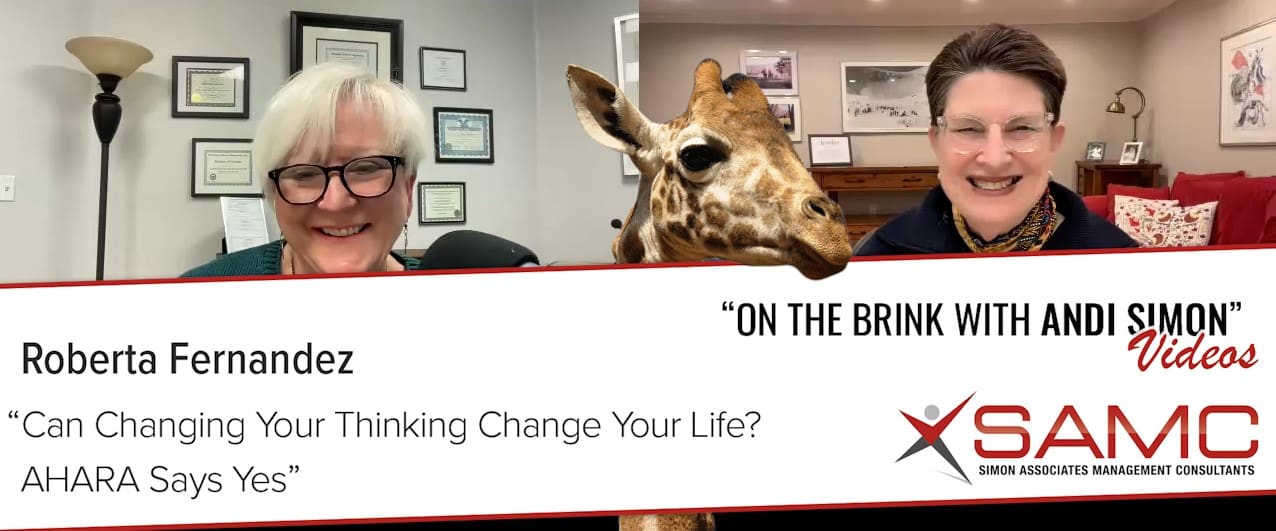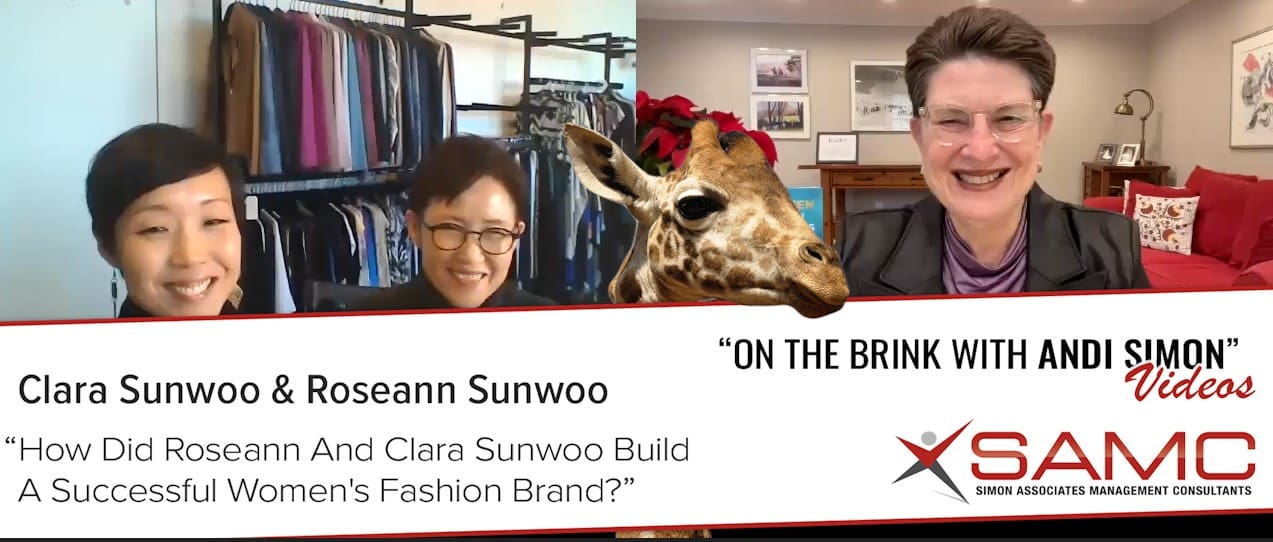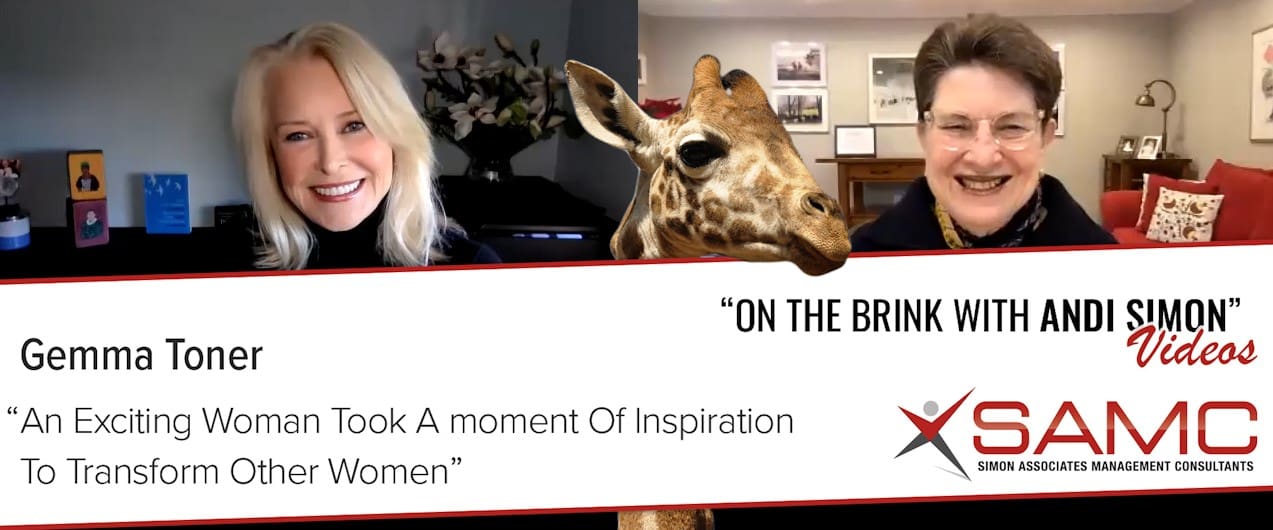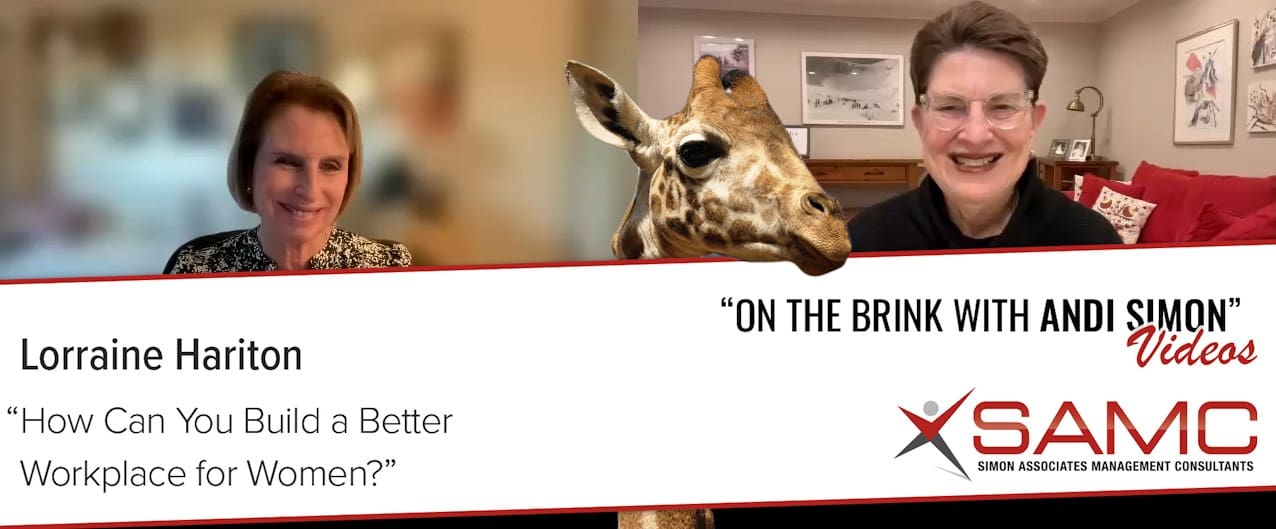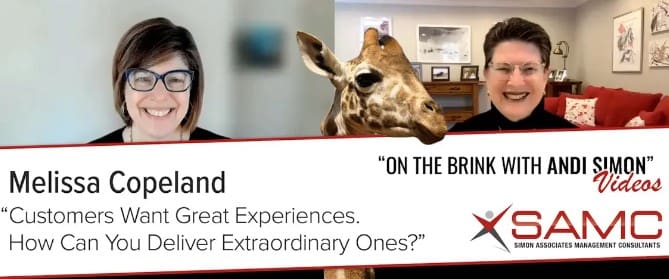Hear how a great idea and hard work made this dynamic duo succeed
This is one of those amazing stories that you’ve heard 100 times but it never ceases to make me smile. Clara Sunwoo and her husband came to the United States from Seoul, Korea in 1975 with two suitcases and $1,000. Now, 49 years later, Clara and her daughter Roseann are riding the wave of the very successful fashion business they built together, ClaraSunwoo. I have one of their jackets and I love it. I am honored that they are part of our book, Women Mean Business: Over 500 Insights from Extraordinary Leaders to Spark Your Success, co-authored by Edie Fraser, Robyn Freedman Spizman and myself, and even more honored to bring them to you today. Enjoy.
Watch and listen to our conversation here
Wisdoms for entrepreneurs from Roseann and Clara Sunwoo:
- You need to be fearless. All the women out there, if you are having second thoughts or you have a great idea, don’t wait on it. Give it a try.
- Learn as you go.
- We saw a need and we filled it (very Blue Ocean Strategy!).
- Just take that leap of faith. A lot of women in business, or women who want to go into business or become entrepreneurs, have fabulous ideas, but think they have to have all the certificates or degrees. You don’t.
- Sometimes I would be the youngest female or the only female in a meeting. We as women really need to empower ourselves and get to another place here.
- The way you get through the tough times is with the people that surround you. Go with your gut in the beginning and take those risks.
- Data is so important. Pay attention to what it is telling you.
- Really love yourself.
- Never say you’ll never do something or never say no to something, because you might find you’ll be surprised.
To connect with Roseann and Clara, you can find them on LinkedIn, Facebook, Twitter, Instagram, YouTube, Vimeo and their company website Clara Sunwoo.
Want more on how to succeed as an entrepreneur, especially as a woman? Start with these:
- Marsha Friedman—How A Woman Entrepreneur Took A Little Idea And Turned It Into A Big Business
- Amanda Zuckerman—How To Turn A Big Idea Into A Huge Blue Ocean Success!
- Finding The “Holes in the Cheese” To Build A Successful Business! Meet Kim Shepherd
- Stephanie Breedlove: How Women Entrepreneurs Can Think Bigger, Build Sustainable Businesses, and Change the World
Additional resources for you
- My two award-winning books: Rethink: Smashing The Myths of Women in Business and On the Brink: A Fresh Lens to Take Your Business to New Heights
- Our new book, Women Mean Business: Over 500 Insights from Extraordinary Leaders to Spark Your Success, co-authored with Edie Fraser and Robyn Freedman Spizman
- Our website: Simon Associates Management Consultants
Read the transcript of our podcast here
Andi Simon: Welcome to On the Brink With Andi Simon. I’m Andi Simon, I’m your host and your guide. And as you know, my job is to get you off the brink. We want to bring you people who are going to help you see, feel and think in new ways. Because it’s only when you see something and you feel it that your brain can start to think about, how can I apply this? And how can I do it in a way that’s going to help me soar? And that’s what we love to do.
I have today two marvelous women who are going to help share with you their own journey. And when you listen to their journey, you’re going to go, oh my, if they can, I can. And what kind of wisdom have they brought to their whole industry of women’s fashion? I met Roseann and Clara Sunwoo as I was doing our book, Women Mean Business: Over 500 Insights from Extraordinary Leaders to Spark Your Success. And their pages in here are just gorgeous.
What we did was, we collected the wisdoms of 102 women, and Roseann and Clara came to us, I think, from Robin Spizman, one of our co-authors, and we were so excited to share. So first, I want to tell you a little bit about them. I want to thank them for joining us. It’s going to be fun to really dig into two creative women who have built something unusual. I’m wearing their jacket today and their blouse and their pants and I wear it all the time. It’s so comfortable and it looks good and it’s really designed for me without them knowing me.
So who are they? Clara Sunwoo, the name of the company that they founded. They make clothing that’s strong and feminine and every day ready. It’s true. Since 1997, Clara Sunwoo and her daughter Roseann have worked together to create timeless designs that fuse classic styles with modern edge. And this fabric is really fascinating. You’re going to really understand it as they talk about it. Their goal is to have women not just look, but experience and feel edgy, empowered and beautiful. Yes I do, it’s so much fun. We’re a cross-generation ageless lifestyle brand. Every design they create must be wrinkle free, travel friendly and effortless.
They know me. I’ve already got 3 million miles on American, over 100,000 this year alone. Every week on a plane. You need clothes that move with you. So today we’re going to hear about their journey, because I do think it’s a journey that is going to inspire you. It’s going to absolutely celebrate what they’ve done, but elevate what you can do and educate you about how to think about what’s happening and what change can bring to you and your brand or your business. Roseann and Clara, thank you for being here today.
Clara and Roseann Sunwoo: Oh, thank you so much for having us. We’re really happy to be here.
Andi Simon: I can’t tell you how, and it’s really fun to share them. Everytime I see them, I go, oh, this is so much fun. Please share your story because it’s a very touching story. It touches my heart and I don’t want to share it for you. Please.
Roseann Sunwoo: So one of the things I really want to let everyone know that is listening is we did not go to fashion design school. We’re not from that background. My mother and father came to the United States from Seoul, Korea back in 1975 with two suitcases and $1,000. $1,000. So you can imagine with $1,000, you’re not buying much. Then I was born and I remember I became an unknowing apprentice in the family. So I know, mom, we have a lot of photos in the family. We’re wearing the same watermelon prints as children. We would make everything. We made curtains, pillowcases. We were hands on, and it really came from necessity, the talent to make things, to use your hands. We were not going in a direction, going into fashion in any sense. However, we were making clothing for friends, family or for ourselves. And a lot of people would ask you all the time to make clothing for them.
Andi Simon: My mother’s mother came here from Russia through England to here, and she was a seamstress, not an uncommon job or career. I’m not sure she thought of it as a career. It was what made enough money for her to raise six children. So I fully appreciate this. As you were making clothes for others, what did you discover?
Roseann Sunwoo: They were gorgeous, like all shapes and body types. What we noticed is, the fashion industry, and we were feeling the same thing, they put us in categories. I felt like women had to, if you’re this type of person or this age bracket, you must look like this. And it was really tiring and it was really just in our minds, we’re very modern and we’re very forward thinking. And it seemed backwards to us, and it was really frustrating to try things on where things were ill-fitting.
I think what we’re known for as designers is the perfect fit. We’re both perfectionists, we’re very detail oriented. And it’s the subtle, the subtle work that we do that really just, things drape well and we understand the body, the form, really well because we work with so many different body shapes, so many different women. And it really allowed us to understand how to design better. And also we knew who our audience was. We realized there were so many women out there that were feeling the same things we were.
When we talk about an Ageless Lifestyle Brand, we have so many different types of women wear our collection, and it’s really about how you put it together. And I want to go back to the way you feel. Looking good is wonderful because it’s going to make you feel good when you look good. But it’s really the feeling, the empowered on the inside. And when you wear fabrics that let you move and breathe and you feel really comfortable in it, but it’s high fashion because we’re not cutting corners, I think that’s going to empower women, and it’s going to make them really elevate in so many ways. I think that’s important. And that’s our main reason for creating the line. We did it in 1997.
We started with a capsule collection. There was a lot of risk because we used our life savings. I think we said, I had approached my mother and I said, why don’t we create a very tight collection, debut it at a tradeshow and just see what happens. And I was actually possibly heading towards law school, being the good immigrant child, everyone expects you to go to law school or med school, that’s what happenss. That was my parent’s dream back then. But I made a U-turn, and I’m so glad we did make that U-turn.
It was very, very nerve wracking because trade shows are expensive to do. But in the beginning, you learn as you go. We did not come from the business background, the fashion background. It was winging it a little bit. And I want to talk about this too. I think a lot of women in business, or women who want to go into business or become entrepreneurs, have fabulous ideas, but I think they never get to the other side until they feel like, I need to learn everything. I need to make sure that I have this degree, this certificate, and then once I get there, I’m going to jump to that other side.
I think in reality, it doesn’t work like that. I think there are certain things that you need. You need to get those licenses and certificates. But for many to jump, to start your business, it’s a little bit of just taking that leap of faith and the hope, and it does go back to hope, where obviously our back was against the wall and we were hoping that this would work. And it did.
Andi Simon: You know, I often talk about…I’m an anthropologist and I love to talk about taking observations and turning them into innovation. At the time, were you already seeing what you know now about the clothing industry? I can fully appreciate how the clothing industry categorized women and made clothes for particular clients without any larger philosophy, because what you’re talking about is a very different philosophy than something for a 50 year old or for a 30 year old. I mean, you were talking about being able to travel with it, feeling flexible, letting them feel good…was that early in your observations about this or did it come with time and maybe both?
Roseann Sunwoo: I think it was actually early on because it started with just ill-fitting things. And you know, if we give it more shape. It made us happy to give shape. We noticed a lot of women were wearing, if they felt uncomfortable with themselves, they would wear larger, looser pieces. And we saw that that wasn’t helping them. And they could have fun with fashion.
And I feel like fashion is, there’s a sense of joy when someone feels, there’s joy in that. And we really felt some of our best moments where women would come out of the dressing room and they’re almost in tears. And when you feel and experience that, we realized we had something to share. And it made us feel really good.
So I think it started off with fit and seeing that joy and then really understanding that…I think also women and business at that point, I remember being in a lot of meetings as I was working with different companies, sometimes I would be the youngest female or the only female in that meeting. I noticed that. I started to realize, we really need to empower ourselves and get to another place here. This is not, especially in the fashion industry. That’s what I saw.
Andi Simon: I was that woman. I left academics and went into banking as a consultant, and I was always the only, the first, whether it was a boardroom or it was the C-suite and I didn’t really know how to dress, I felt like it was theater. What is the part I’m supposed to play and how do I dress the right way to fit that? What do I say?
People talk about imposter syndrome, and I said, I’ve always been an imposter. I was going into venues with folks who didn’t look like me, and they didn’t say anything, but you try to figure out, how do I belong, what do I do to fit in? And the clothing. Brooks Brothers was for men. And you bought their clothes for women. But you look like a man. And it wasn’t me, but I wasn’t quite sure what was me. And so, you know, you’re raising some important questions for women and for you who are watching or listening. Think carefully. Who are you? How do you dress so that you thrive and you feel exhilarated about putting it on? This is a great jacket. I put it on, I go, oh. Please continue. As your journey went, how did it become 3000 boutiques? Because this didn’t happen overnight.
Roseann Sunwoo: No, it didn’t happen overnight. But, I think we like doing things locally, being hands on. We noticed that we like to know who our buyers were. They gave us feedback. It was almost like a patchwork of boutiques where, and that wasn’t something that we originally said, okay, this is our business plan and this is what we’re going to do. But we realized that the whole department store model was just not quite….
I felt like as designers, we were going to work for them. And they were going to box us in in a way where we have to design for what they were looking for during that season. And I don’t think, we would not be able to shine in that realm. So once we started working with all these local boutiques, a lot of it was word of mouth. We also had a lot of celebrities find our collection. A friend, they were shopping at a boutique, they would get gifts that led to a lot of big surprises. And I’m going to mention, we were on Oprah’s favorite list not that long ago. And actually they did a commercial on us, which was amazing. We had a Today Show segment. We’re in this book, Women Mean Business.
We are so lucky. We work hard and we’re always, I think we don’t know how not to work because that’s who we are, we love what we do. However, the consumer out there reached out to us. We didn’t use PR companies. It was a very organic way of growing. And then we just grew into 3000 boutiques with boutiques in every state. And we realized that that was where we belong.
Andi Simon: Now, how do you manufacture to support 3000 boutiques? I mean, are you like Zara that makes it just in time or do you have a lot of inventory? I think it’s interesting to think about, you made a good point before. People want to be really competent before they go into something. And you illustrate that we learn on the job and we grow and prosper. You can too. But how do you do that part?
Roseann Sunwoo: So sometimes we wish there was a crystal ball. We do. And I have to say the business has changed a lot. The fashion industry has changed a lot in terms of the calendar, after the pandemic. Even department store buyers, corporate buyers, down to boutique buyers, they are buying a little bit closer to season. So the calendar has changed.
Knock on wood, we’re confident enough to have built a loyal clientele that we do tend to create our collection and maintain inventory up to a certain point so that we can be ready when the stores are buying later than the season, because you can’t just turn things around overnight. We’re always living a year ahead or a whole season ahead.
I think it’s definitely, my heart goes out to a lot of newcomers in the fashion industry, because I don’t think it’s fair to expect everyone to have the merchandise. But we are very fairly lucky where we’re able to have that loyal clientele that we know that they’re going to support us.
Andi Simon: Because to your point, it’s a challenging time, both in terms of cash flow, inventory, financing and the complexity. You didn’t go to law school, but in some ways you are very analytical and lawyer-like. Are you a data person?
Roseann Sunwoo: Yes. So I believe In the very beginning when we started our company, there wasn’t much data to go with so you go with your gut, you’re creating relationships, which, by the way, I think are so important because the mills and the relationships that I have made 25 years ago are the same mills I work with now.
Andi Simon: That’s wonderful.
Roseann Sunwoo: And it’s just so much better when you have that trust and the relationship and that history. I think that’s how you get through the tough times with the people that surround you. Going with your gut in the beginning and taking those risks, data is so important. And now with the computers and all of the information that you’re getting, whether it be on the wholesale end or the retail end, we really need to know what the consumer is thinking. We need to know how she’s changing, where she’s going, what she’s looking for.
And our data is really showing that women are starting to break away from this traditional sense of, I need to look like this because this is my age. Even 20 or, 30 year old women, they’re starting to break away from, I don’t need to wear these things, I can wear what I want, I love vintage clothes. I see a lot of mother-daughter teams just exchanging clothing. I think it’s a beautiful thing because I think women need to support each other more, through generations. Bring them up. And it should not be separated because there’s so much to learn from each other. And I think fashion too, we shouldn’t separate.
Andi Simon: And you’ve also given them a way not to separate. And I think that’s the beauty of what you’ve created, because you could preach that. But if you can’t find clothes that allow you to feel and look good at any age, it’s difficult to believe that you can do that. And the magic in what you have is that, I don’t care whether you’re 25 or 75, this jacket will fit you and look gorgeous on you. And when you see it on stars, I go, oh, they were in the same jacket I am. So, you’ve brought a life, a philosophy, that is just extraordinary because you’re living it, but you’re letting others do the same. Clara, You’re smiling. You are a happy woman, aren’t you?
Clara Sunwoo: I try.
Andi Simon: If you are, it’s really wonderful to watch you smile. I’m curious, you have the 3000 boutiques, but I bought online. How big is your online business?
Roseann Sunwoo: So our online business started ramping up more, so I think during the pandemic. So we were focused more on a wholesale buyer. I think the world changed real fast. I mean, we had an online presence before the pandemic, but we weren’t focused on it as much. However, I think with the pandemic everyone sped up with online shopping, even customers that would normally not shop online and say, I have to feel the fabrics, I have to try it on. They had to shop online at that point too.
And now what we’re seeing is the growth on the e-commerce side, on the online shops. However, our boutiques are wonderful with carrying the line and keeping in touch with their loyal customers. So at the end of the day, it’s a patchwork. And so it just keeps feeding the whole ecosystem of both the wholesale, the brick and mortar, the online, the e-com.
So we’re in a very good position right now, but again, going back to data, and I think going into e-comm, data is so important because now you’re not face to face with the customer but they can also share a lot. We get a lot of exchange and information and also just through social media. I mean, what I love about our social media, you see women of different ages, different body shapes, maybe not so much online. You could see our models.
We’re still a small company, so we don’t have the budget to have 20 different models. We’re not there yet. But what I love to show in social media are the real women because then you can really see what we’re doing.
Andi Simon: And I think that reality takes the abstraction. Remember, we live this kind of illusion and we imagine and then when you see it and you go, oh, that’s what that is. Because if I hadn’t met you and Robin hadn’t told me how great you guys were, I’m not sure I would have been that curious about what it was. It didn’t seem to fit me. And then I saw it, and I went, oh, my goodness, that not only fits me, so, now I have two jackets, two pairs of pants, two blouses, and I’m not quite sure I’m ready for the next one yet, but I don’t have enough time to wear them all.
But it is exciting to be part of something, and I share that with you, because now I don’t feel like I’m buying a thing, I’m buying part of us, and that collaboration, that sense of celebration is really so very exciting. I am curious and I’ll be satisfied with my curiosity. How did you come up with this fabric? It’s not leather.
Roseann Sunwoo: No, it’s not leather. And a lot of women don’t like leather. I personally don’t either. It’s very restrictive, it’s stiff. So what you are wearing is a special fabric we had invented, and we call it liquid leather. And liquid leather really feels like, it’s a knit. It’s very soft. It’s butter soft. It’s stretchy. It’s so lightweight and thin that you can actually roll up your jacket and put it in your purse. I know that it almost looks like a leather blazer on you right now, but it’s very lightweight.
We spent a lot of time trying to invent this fabric because we felt like leather, or blazers and jackets, it’s a sign of a woman that’s empowered, at least to us. It’s a very powerful jacket but we don’t like that stiff feel. And again, that’s very masculine. And I felt like we could take that idea, invent something that was so just feminine and comfortable and travel friendly and let women feel empowered because when you put a leather jacket on or a blazer, there’s this, at least I feel something, I stand differently. I think it’s a sign of empowerment. And I love the fact that, it’s made for everyone.
Andi Simon: And it travels. I swear it travels amazingly.
Roseann Sunwoo: You could put 50 of those jackets in a carry on.
Andi Simon: Yeah. And, it comes out looking perfect. And I went, this is really amazing, amazing, amazing. So thank you for satisfying my curiosity because I did have to figure out how you do this. It’s not leather, it looks like leather. It feels like that blazer. I love to wear it. Do you know many blazers I’ve worn over my lifetime? It truly is part of my style. Pair of gray pants and a blue blazer and you’re ready to go.
Roaseann Sunwoo: We call it the new modern cardigan. And that’s how women should think about it. It’s like, do you grab a cardigan when you’re chilly at the office? Or if you’re out to dinner or you’re at the movie theater? I’m always kind of cold with the AC. This is something that you could just pull out of your bag. It’s very light.
Andi Simon: So I want to wrap us up because I’m about ready, but before we’re gone, you wrote something really wonderful here. I don’t want to lose it. In our book Women Mean Business, you write: “The modern woman is ageless and fearless.” What a great view. “And the fashion industry must not categorize her. We are obsessed with changing the way women think about style and comfort. Our mantra: to make women feel good and spread joy, one woman at a time.”
It captures the power and essence of who you are, how you’ve come from an immigrant with $1,000 in your bag and turned it into an amazing experience. And I don’t think you’re done. Do you see much in the future that’s going to be coming soon that we should pay attention to. And then we can wrap us up.
Roseann Sunwoo: I don’t think we’re done either. I think the creativity that we have, I think we just got started because we feel the energy. The women now, I feel like they’re finally understanding what we’re doing. And I think we’re on the same page now, and there’s a lot of women, like, it’s not just a brand to shop, but it’s like, join the club. It’s a mentality.
Andi Simon: Don’t lose that thought because you pull us into belonging, to the next stage in our personal lives and your design. So I think you’re absolutely right. It isn’t the end. It’s the beginning of the next phase. And this is a collaboration that’s going to be very exciting. Okay, my dear friends, one or two things you don’t want our listener or viewer to forget because they always remember the end better than the beginning.
Roseann Sunwoo: Well, we both think that you need to be fearless. All the women out there, if you are having second thoughts or you have a great idea, don’t wait on it. Think about what you can you lose? If it’s not grave, try, because you don’t need to know everything to start.
The other thing is, really love yourself, find joy in fashion and don’t let people categorize you because every day could be something different. I’m a big believer of, never say you’ll never do something or never say no to something, because you might find you’ll be surprised. And I do want to say, if you do want to look for our brand online, please head to clarasunwoo.com. And we are so happy that you have invited us for this podcast and this is a great time. Thank you.
Andi Simon: It’s a great time and I’m happy to be part of your club. And so send me a little membership card because I think that the clothes are transformative. The book that we wrote was to celebrate and elevate women. I am so delighted that I had the opportunity to meet you and to share you. You really are taking women off the brink and helping them see, feel and think in new ways so they can soar. It is fun and you’re also smiling a lot, which I think is great.
I’m going to thank you and everyone for coming today. I do want to recognize the fact that Women Mean Business, the title of our book, is a trademark owned by the National Association of Women Business Owners, who have really done an amazing job helping women business owners grow, thrive, and build their businesses together. So I thank them for the opportunity to use the title for our book, Women Mean Business. It has been a pleasure.
For those of you who come, send me new people to bring on. I have no shortage of a line out the door, but I always love my listeners to come and send along people they met who they thought are worth listening to. As you heard today, the journeys are all very important because they open your mind to what you can be. All my books are on Amazon, Barnes and Noble, and I would love you to give me a review on Amazon if you really love it, because it’s great fun to share it and I’m a sharer. Been a pleasure. Thank you for coming to On the Brink. I’m going to say goodbye now and have a wonderful day. Bye bye.
WOMEN MEAN BUSINESS® is a registered trademark of the National Association of Women Business Owners® (NAWBO)


